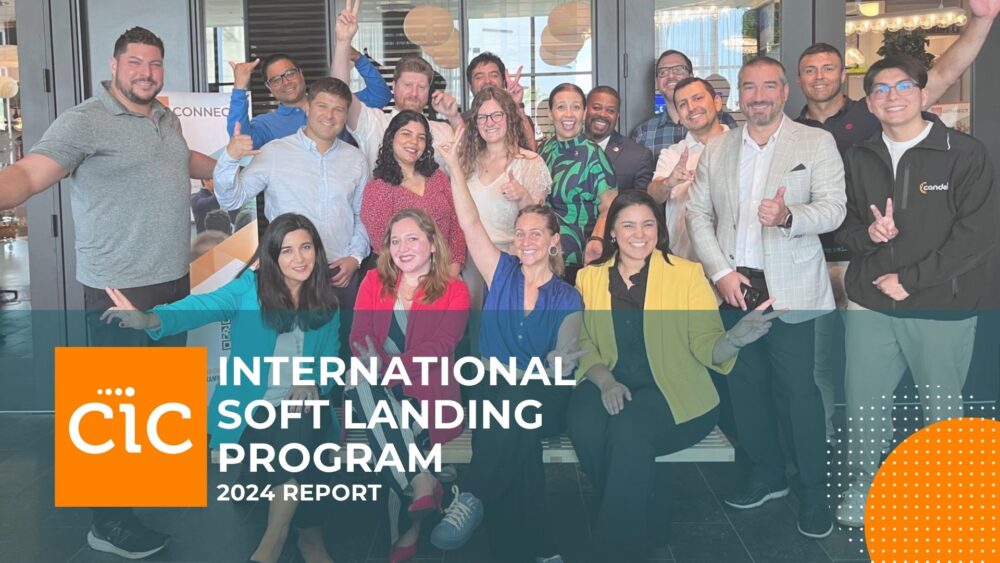Reflections from Alejandra Winter, Director, CIC International Soft Landing

Globalization has become a powerful force reshaping entrepreneurial ecosystems worldwide, enabling regions to showcase their unique strengths, connect with international markets, and establish themselves as leaders in technology and innovation. Across regions, internationalization acts as a bridge, showcasing local talent to the world while attracting new resources to strengthen these ecosystems.
Whether it’s Latin America’s burgeoning startups, Europe’s cautious yet ambition expansions, the Middle East’s emerging innovation hubs, or South Korea’s strategic forays into science and technology, each region brings a distinct approach to the global stage. In this article, we’ll explore how these diverse ecosystems are navigating internationalization, uncovering opportunities, challenges, and trends that define their journeys.
Latin America: Emerging Confidence on the Global Stage
We’re witnessing this evolution most prominently in Latin America, where an increasing number of startups are crossing borders to explore new ways of conducting business in cities like Miami. Over the years, we’ve observed significant growth in the preparedness and caliber of these startups and the ecosystems that support them. A recent milestone to celebrate is the inaugural Colombia Tech Week in Bogotá, which brought together over 8K attendees (including 2K from abroad) and 160+ VC funds last September.
Year after year, Latin American entrepreneurs arrive in Miami with greater maturity, sharper messaging, and a deeper understanding of what it takes to scale globally. These companies are not only focused on expansion but also on representing the talent of their region and proving they are ready to compete on the world stage. Miami has become the ideal platform for showcasing these capabilities, providing feedback, and offering the support needed to match the fast pace of the North American market.
Europe: Balancing Ambition with Caution
European startups are expanding into the U.S. with increasing ambition, driven by government initiatives that encourage international growth. However, the breadth of the European market and the relatively smaller investment ticket sizes often lead to a cautious approach, requiring additional support to mitigate risks when entering the higher-stakes U.S. market.
This cautious approach highlights the necessity for greater support and risk mitigation strategies, enabling these startups to confidently tackle the North American market and unlock their potential for expansion.
Middle East: Building Regional Hubs with Global Potential
The Middle East is undergoing a phase of rapid regional development, with innovation hubs in places like Dubai and Saudi Arabia leading the charge. These ecosystems are attracting talent and capital, positioning themselves as global centers of innovation. Over time, they could serve as launchpads for Middle Eastern startups to expand into global markets. Smaller countries like Kuwait, Qatar, and Bahrain are making strides in developing their startup ecosystems, yet they continue to face challenges, particularly in securing investment opportunities for early-stage companies. While larger markets have a strong presence of family offices—privately managed investment firms for high-net-worth families— and VC firms, this gap creates a significant opportunity for accelerators and incubators to support high-impact startups addressing societal challenges.
Governmental involvement is a key driver of startup growth across MENA, with governments prioritizing the creation of high-quality companies to attract global talent and strengthen their economies. Countries like Saudi Arabia, focused on Vision 2030, require initiatives that align with their strategic goals.
South Korea: Bridging Science and Technology with Global Collaboration
A standout example of internationalization worth highlighting is South Korea’s growing presence in Boston. South Korea has demonstrated remarkable innovation in fields such as biotechnology and pharmaceutical development. By expanding into hubs like Boston, Korean startups are connecting with one of the most dynamic scientific and technological ecosystems in the world, fostering strategic collaborations in research and development.
Through partnerships with U.S. medical facilities and research centers, these startups not only seek funding and market entry, but also are looking to enhance their global competitiveness. South Korea’s focus on the internationalization of science and technology underscores its commitment to becoming a key player in the global knowledge economy. With support from the South Korean government, startups are being encouraged to look to the global stage as they scale and expand — not only to Boston, but to the EU, Japan, and other key markets as well.
A Collective Global Vision
This global dynamic, where each region cultivates its identity and strengths, reflects the collective ambition of entrepreneurial ecosystems to establish themselves on the world stage. Today, internationalization is not just a pathway for growth, it’s an opportunity for every region to showcase its potential and contribute to the global conversation, advancing toward becoming leaders in technology and innovation.
At CIC, we believe innovation knows no borders. Join us in empowering entrepreneurs across the globe to thrive, scale, and make a transformative impact. Connect with us to learn how you can be part of this journey and help shape the future of global innovation.




